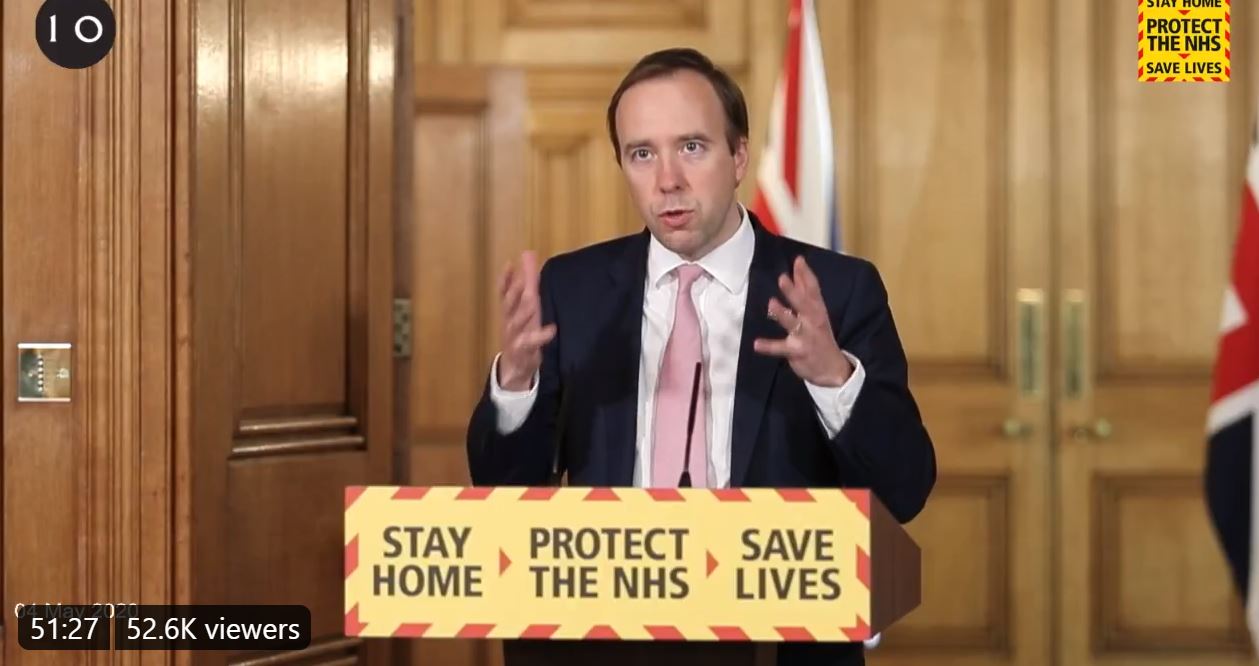The health secretary has announced the launch of a contact tracing app for the coronavirus to help the country “get back on its feet.”
Matt Hancock said there has been “huge enthusiasm” for the pilot scheme on the Isle of Wight for the app which will alert users if they have been in close proximity with a person with Covid-19.
However, there are concerns about users privacy and liberty campaigners have repeated warnings that the coronavirus pandemic may be exploited by leaders in a “power grab”.
Concerns at ‘high levels’ about users privacy
“Some of these measures impose severe restrictions on people’s freedoms, including to their privacy and other human rights,” said the campaign group Privacy International (PI). “Unprecedented levels of surveillance, data exploitation, and misinformation are being tested across the world.”
Amnesty International echoed those concerns with their UK director Kate Allen saying virus control measures could “open the door to pervasive state surveillance and privacy infringement, with potentially discriminatory effects.”
A scathing report, published today (Monday) by the Health Service Journal, said the new NHSX app failed clinical safety and cyber security tests, adding: “There are also concerns at high levels about how users’ privacy will be protected once they log that they have coronavirus symptoms, and become “traceable”, and how this information will be used.”
‘Privacy and security was paramount throughout app’s development’
A spokesperson for the Department of Health and Social Care (DHSC) said “the NHS covid-19 app has not failed any clinical assessments” and will “go through the normal assessment and approval process” following the Isle of Wight pilot.
“Privacy and security has been paramount throughout the app’s development, and we have worked in partnership with the National Cyber Security Centre throughout,” the spokesperson said. “The app uses low-energy Bluetooth, not GPS, and therefore it does not track people’s locations or record their locations.”
‘We’ll learn a lot – where the Isle of Wight goes, Britain follows’ – Hancock
NHS staff could download the app from 5pm this evening, Hancock told today’s Downing Street press briefing, with members of the public, living on the island, set to receive a letter on Thursday to persuade them to join the trial by downloading the app.
“We’ll learn a lot, we’ll use it to make things better, and we want to hear from you,” Hancock said. “Where the Isle of Wight goes, Britain follows.”
The health secretary said the pilot on the island off England’s south coast will not include any changes to social distancing measures while England’s deputy chief medical officer Jonathan Van-Tam warned: “Testing and contact tracing is going to have to become part of our daily lives for the future.”
Van Tam said the government is aiming to recruit and train 18,000 contact tracers before the middle of May, but would not disclose the app’s expected effect on the ‘R’ number – the average number of people infected by someone with the virus. Keeping ‘R’ below zero is one of the government’s five tests to end lockdown and ease social distancing measures.
Free Bluetooth app will track and alert
The app will be free and use an automated tracing process via a smartphone’s Bluetooth to track users who come into contact with each other.
Users must inform the app if they develop symptoms and their disclosure triggers an anonymous alert sent to other users of the app who have had recent close contact. The alert will ask the recipient to seek a test or go into quarantine.
Non-smartphone users may be provided with trackers such as a Bluetooth-enabled wristband, as has happened in other countries, including Bulgaria and South Korea.
The creation of the contact-tracing system, Hancock said, is a “huge national undertaking of unprecendented scale and complexity”.




